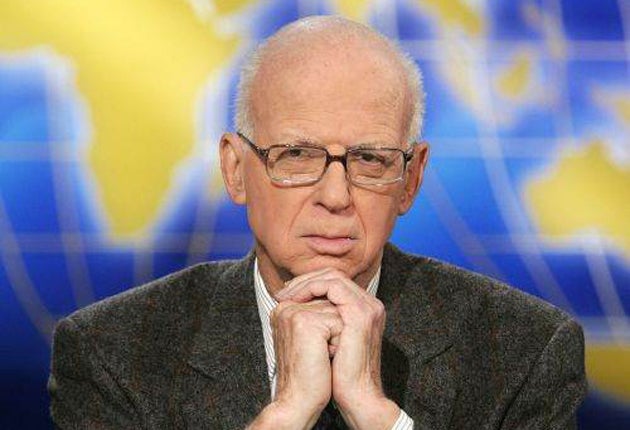Rupert Cornwell: A shouting shop needs the quiet voices of truth
Out of America: Conservative blowhards have it in for the nation's public broadcasters

This has been a miserable week for serious journalism here, in what they like to call "the nation's capital". First came news of the death of David Broder, the veteran Washington Post political reporter and columnist. Maybe Broder wasn't the greatest of writers. But he possessed a thoroughness, a fairness and a civility that's all but vanished in the shouting shop that is modern American politics. He was a listener not a blowhard, a reporter who went where the facts led him. In a stridently partisan city, he was the least partisan of journalists. As a result, David Broder was trusted. Which brings me to the other wretched news of the week – the debacle at National Public Radio.
You have to live here, in this universe of conservative bloviators such as Rush Limbaugh, to appreciate how valuable public radio is. NPR is about as accurate and objective as is possible in modern journalism.
Rather like Broder, it is sober and reliable. It is regularly voted one of the most trusted, if not the most trusted, media source in America. By the standards of BBC Radio 4, to which it is often compared, NPR may lack "attitude". But if you want attitude, there's Limbaugh and his ilk.
Last week however, this venerable edifice trembled, not once but twice, in sting operations mounted by a conservative activist called James O' Keefe. In the first, he surreptitiously recorded NPR's former chief fundraiser making rude remarks about the Tea Party movement during a lunch with what he thought was a potential $5m (£3m) donor to the network. That episode cost both the fundraiser and the NPR chief executive Vivian Schiller their jobs.
Twenty four hours later came more trouble – this time the release of an audio tape in which another fund-raising executive said NPR might be able to protect the identity of the same "donor" (who claimed to have links with Muslim groups), in any US government tax audit.
Cue to more outrage on the right, more unwanted headlines, and the suspension of a second NPR fundraiser until the matter is cleared up. And this double disaster came only a few months after the network came under assault from both right and left for dismissing black commentator Juan Williams when he told the conservative Fox News that he felt nervous when he saw people in Muslim dress on an aeroplane.
The episode merely confirmed suspicions on the right that behind a façade of even-handedness, public radio consisted exclusively of po-faced white liberals, drowning in political correctness. In an interview on the eve of these latest scandals, Williams described comments within NPR at the time of his dismissal as "the worst of white condescension to black people." Now public radio is being branded hypocritical and a borderline tax cheat to boot.
The truth is rather different. Yes, NPR's relentless search for donors and sponsors is not pretty. But it maintains – as far as I can judge – an impermeable wall between its business and editorial sides. Its coverage of the Tea Party has been scrupulously fair. And far from seeking to hide its embarrassment, public radio led its bulletins with news of the O'Keefe/Schiller mess.
More important, NPR is a rare example here of serious journalism that is flourishing and expanding. In the decade since 9/11, its audience has grown by some 50 per cent, and 27 million now tune in every week.
But ask any newspaper: this sort of coverage doesn't come cheap – and these public relations disasters for NPR come just as the Republican majority in the House of Representatives, led by the noisy Tea Party faction, is demanding an end to federal funding of public broadcasting.
In absolute terms the sums involved are puny: $451m (£280m) annually for the Corporation for Public Broadcasting – a drop in the $3.7trn federal budget ocean. Most of it goes to public TV and affiliate public radio stations that buy its content; less than 2 per cent of NPR's budget comes from federal funds.
NPR has been around for 40 years now. Almost certainly, it could get by without public funds – and without doubt would be better off that way, no longer at risk of being held hostage by Congress, in America's never-ending culture wars.
The problem lies with the member stations who pay for its programmes and who depend partly on federal money to do so. The trouble is, listeners increasingly want to get this programming on-demand and directly, and NPR is offering it via its website, for free, and on an expanding panoply of electronic outlets, Twitter, Facebook and the rest.
But the more NPR does this, in effect by-passing its member stations, the more reluctant those stations will be to support it. However, if they pull out, then access across the country to NPR's traditional radio output will be reduced – just when listeners seem to want quality programming more than ever. For the moment, federal funding is vital for squaring that circle, but now that funding itself is in question.
Is NPR "liberal"? Yes, in much the same way the BBC is seen by its detractors as liberal. But at its best, it resembles David Broder, one of the few media figures here capable of moving beyond the straitjacket "if you are not with me, you are against me" mentality of US public life.
Long may it continue so.

Join our commenting forum
Join thought-provoking conversations, follow other Independent readers and see their replies